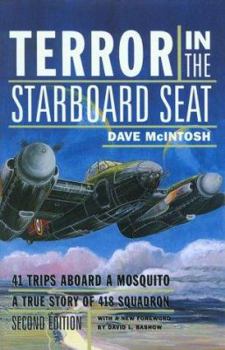Terror in the Starboard Seat
Select Format
Select Condition 
Book Overview
No Synopsis Available.
Format:Hardcover
Language:English
ISBN:0773730893
ISBN13:9780773730892
Release Date:January 1998
Publisher:Stoddart
Length:44 Pages
Weight:0.80 lbs.
Dimensions:0.7" x 5.8" x 8.8"
Related Subjects
Americas Canada Canadian Contemporary Europe Fiction Historical History Literature & Fiction MilitaryCustomer Reviews
4 ratings
A classic
Published by Thriftbooks.com User , 17 years ago
This non-fiction account of wartime activity is brilliantly written and historians should take note - Although this is a historical document, McIntosh grabs his reader by the throat in a page-turner that reads like a No. 1 best-selling thriller - but with such unusual tenderness. Whatever you like reading, you're almost certain to love this. It is an excellent read and I can guarantee that long after reading this book, you'll still be thinking about it. Outstanding.
A Gripping Memoir
Published by Thriftbooks.com User , 22 years ago
This book ranks among the best--Farley Mowat's "And No Birds Sang", included--about a Canadian's experiences during the Second World War. It is, however, not always a light-hearted account, and by no means a glorification of war. As is readily clear, McIntosh--like many of his peers--was not an overly enthusiastic participant, yet undertook his duty with much courage. Terror in the starboard Seat is a fine testament to this courage as well as the sacrifice that so many made in order to rid the world of Naziism.
Canadians are different
Published by Thriftbooks.com User , 24 years ago
Perhaps it comes from living next door to Americans, but Canadians have a knack for staring tragedy in the face and remembering something to laugh about afterwards. It's little wonder that many of the funniest modern comedians, from John Belushi to Peter Jennings, are Canadians. World War II produced "the greatest generation," says Tom Brokaw, who wasn't there. Dave McIntosh was there, flying 41 combat missions in the navigator's seat of a Mosquito night fighter, and he calls it "the scardest generation." It takes common sense to be afraid; fear is often the one element that provides the extra margin of caution needed for survival. It helps explain why the 24 Mossies of 418 Squadron achieved the highest scores in RCAF history, with 105 aircraft destroyed in the air, 74 on the ground, 9 probables, 103 damaged and 83 V-1s destroyed. Not bad for planes built of Ecuador balsa, Alaska spruce, Canadian birch and fir, and English ash, often by furniture makers. The twin engine Mosquito had a crew of two, but it carried the same weight of bombs as a B-17 and could fly at 400 miles an hour. Granted, McIntosh volunteered for the RCAF. He schemed to get into 418 City of Edmonton squadron, which flew night intruder missions. He was awarded the Distinguished Flying Cross, one of Canada's highest awards for valor. He wasn't looking for a safe and comfortable seat to sit out the war. Most veterans who've been in actual combat have little to say; those who do talk often emphasize the humor. One of their favorite songs had the lines, "When the compass course is west, that's the time that I love best" -- in other words, heading home, away from the enemy. It's little wonder he took until 1980 to write this book. It's a different kind of war memoir. Americans brag, Brits keep a stiff upper lip, Germans are betrayed heroes, Russians are `zhlobi' -- crude and uncouth. Canadians are like hockey players in a power play on the goal -- all of the above, and then some. It has the same mood as `The Corvette Navy' by J. B. Lamb, the loneliness of fighting men who are trivialized by everyone not in combat. Only the Canadian military trains "zombies." There's a common feeling the government compromises anything to avoid upsetting anyone on the home front -- an attitude American soldiers didn't acquire until the Vietnam. Sidney Seid, a San Francisco Jew who joined the RCAF before Pearl Harbour, was the driver (pilots were never called pilots) for McIntosh. Seid loyally stayed with the Canadians even though he could have doubled his pay by in the US forces. It wasn't an easy life. McIntosh tells of one crew that spent its ops circling off the coast of Holland, afraid to cross into enemy territory, faking complete combat reports including targets visited, burning bombers, fires, weather, the whole thing. It was one way to cope with the terror of facing the enemy. Canadian aircrews flew operations, or "ops." The Ame
Reads like a novel. Great page-turner.
Published by Thriftbooks.com User , 25 years ago
This book kept me up until 4 in the morning, laughing, crying. It's got it all. RCAF navigator McIntosh wrote with pathos and honesty. He puts you right inside the Mosquito with his Jewish/American pilot, with whom he had a kind of Butch & Sundance relationship, all that same kind of loyalty and snappy reparte. This is one of the best WWII books I've ever read. Just like with a great suspense novel, you'll find yourself really whipping those pages over. And yet, I was sorry it had to end.





